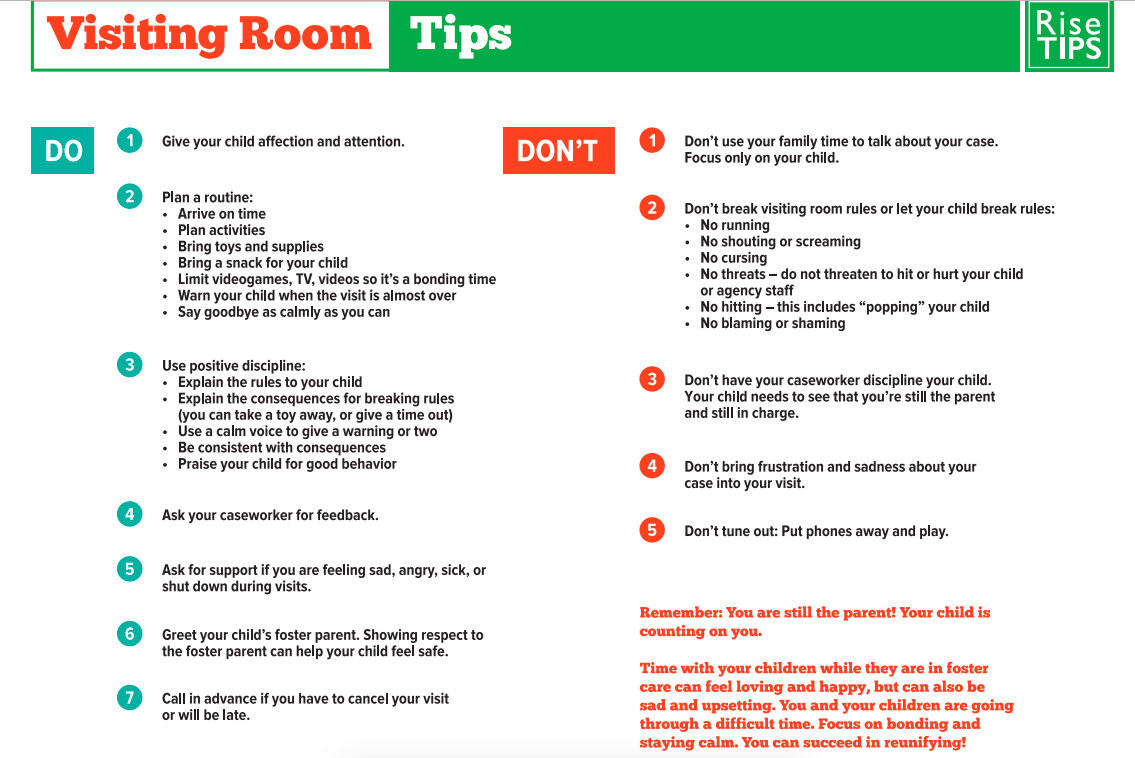|
Having a CWS/DCFs case can be quite nerve wracking. There are case workers, judges, attorneys, CFTs, and classes that may feel intimidating and foreign to the parents. As a part of the case plan, visitations are by far the most important. They show the court that the parent can adequately parent their child. In addition, they also demonstrate to the child that the parent cares about them and makes time for them each week. In the beginning going to supervised visitation can feel like a chore and out of the way but this is the most crucial time.
In the beginning of the case the parents will usually start with supervised visitation. Supervised visitation is when a third party agency or the Agency itself will host visitation in their visitation rooms. The agency will have either the case worker or a worker supervise the visitation. During the visitation, the staff member will watch the visit and write case notes about the parent's interactions with the child. They will note whether the parent was watching the child, caring for their needs appropriately, and behaving with the child in a meaningful way. Such examples would be playing with a child in an age appropriate manner, changing a diaper if necessary, feeding the child the correct foods, and keeping them from hurting themselves when playing. These supervised visits can feel very unnatural for the parent as they may feel that their parenting skills are on "trial". They may act in a very reserved manner or distance themselves from the child as they do not feel that they have a parental role due to the child's placement out of their custody. Also, the visitation monitor may be off-putting making the parent watch their every move and making the entire visit unnatural. Despite the odd feelings or unease parents should always strive to make their visits on time and really bond with their child. In addition, most visitations are short staffed so the parents will usually be granted only two visits or so each around 2 hours. During this time the parent should strive to demonstrate that they do know how to parent safely and bond with their child so that the Agency can note this and expand the visitations. Each visit will be noted in what is known as a visitation narrative/ contact narrative. These will be submitted to the court and are a kind of report card to the judge about how the parent is handling parenting their child. If a parent wants to know about how they are performing at their visitations, they can ask the worker at the end how they did and if they have room for improvement. They can also ask their counsel to subpoena visitation narratives to see the formal comments that are submitted to the court. The court touts that unsupervised visits and beyond are the best form of visitation as the parent can parent and watch over their child as they would without a CWS case. The parent for a visit can take their child out to a park or the library and enjoy some alone time to bond and connect. Even though it may take some time to gain the trust of the Agency, it is worth it to visit the child and perform well at the supervised visits. Once the supervised visits are lifted, the parent will be far more at ease and enjoy their visits with their children more.
0 Comments
Leave a Reply. |
Details
Juvenile Dependency and
|
